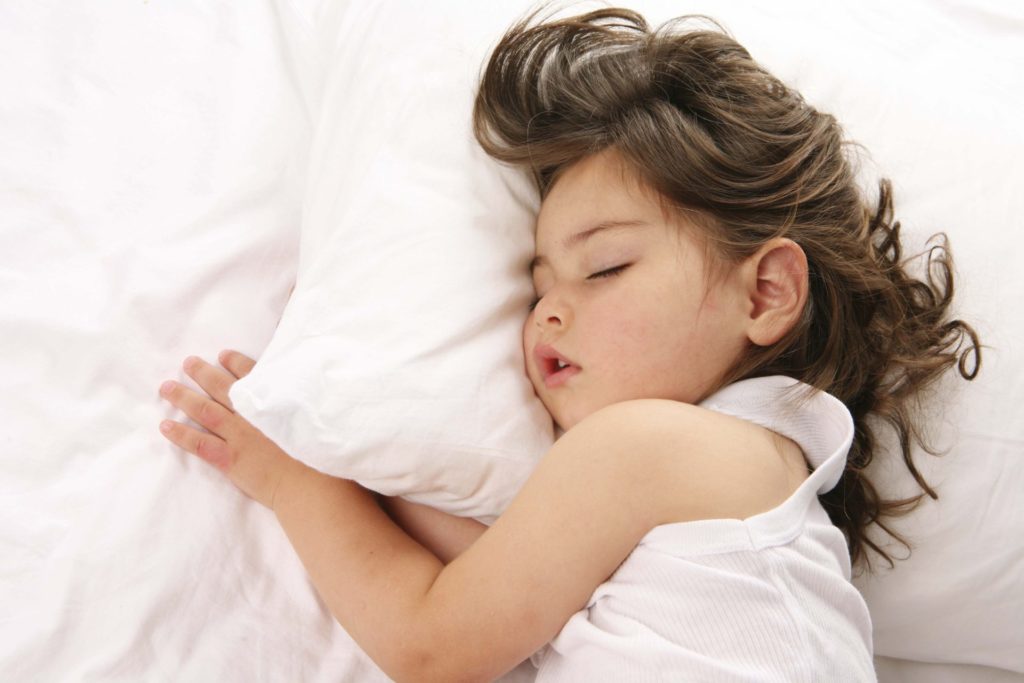
Is your child getting enough sleep?
Not many parents will answer ‘yes’ to this question! I’m lucky to have two ‘good sleepers’ but even they go through periods of bad sleep when I feel like a walking zombie. So what exactly are ‘good sleepers’? How much should your child sleep?
What’s normal?
| Age | Recommended hours of sleep/24 hours (naps + night time) |
| 0-3 months | 14-18 |
| 4-12 months | 12-16 |
| 1-2 years | 11-14 |
| 3-5 years | 10-13 |
| 6-12 years | 9-12 |
| 13-18 years | 8-10 |
This is obviously variable depending on your child’s age and as you can see there’s a range of what is considered normal. Remember that these recommended hours are a guideline as all children are different. The goal is for children (and their parents!) to wake up in the morning well rested and refreshed. So good sleep indicates not just the quantity but also the quality of sleep. The quality is how peacefully they sleep. Bad quality sleep is restless broken sleep when children will often wake up tired.
For younger children it is normal for them to wake overnight. Under 6 months they usually wake around 3 times and this then drops to 1-2 times after 6 months. This is why the term ‘sleeping through’ for infants, means managing a 5 hour stretch. Children’s sleep patterns change developmentally throughout their life. School brings about changes as does becoming a teenager. Going through puberty shifts children’s biological clock meaning later bedtimes and sleep ins. And of course just when you think your child is in a good sleep pattern, they go through a developmental leap and have a sleep regression. Sigh…
Although I’ve outlined some of what’s considered normal, there are also medical problems that can cause sleep problems. Conditions include reflux, iron deficiency or sleep apnoea.
Could there be a medical problem?
- Wakes crying in pain or is inconsolable
- Not feeding well
- Not gaining weight properly
- An obvious change in pattern of sleep
- An obvious change in behaviour
- Pauses in breathing
- Wakes up tired despite sleeping most of the night
- Fevers or profuse sweating at night
- Very restless
- Teeth grinding
These are some clues, but I think it’s always safest for your child to have a thorough medical review if you’re worried about their sleep.
Why is sleep so important?
We tend to think of sleep as a time of shut down, but it’s actually a very active time for our children’s brains and bodies. It’s a time for bodies to recover and cells to repair. It’s when memories and knowledge are solidified. And it’s is vital for regulating certain hormones (including growth hormone). Sleep is actually one of the most important elements of my wellness program and improving sleep can have profound effects.
The health implications of sleep deprivation are significant and well documented. I group these into short term and long term effects.
Short term sleep deprivation
These consequences are often obvious. Tired children have difficulty regulating their behaviour and their emotions. They can be irritable, have poor concentration, be impulsive, aggressive or even tearful. All these behaviours can impact on their ability to learn and to socialise.
Long term sleep deprivation
This has been associated with obesity, type 2 diabetes, depression and stunted growth. Too little sleep can also suppress our immune system so your kids get sicker more often. By the way (other than stunted growth) the health implications are the same for us grown ups!
Impact on family life and relationships
When children don’t sleep well, parents don’t either. This can cause a lot of stress even marital disharmony. I see many parents so exhausted that it’s affecting both their physical and mental health. (See my article on PND). From the other perspective marital disharmony and parental stress can be picked up by children which in turns negatively affects their sleep. This creates a vicious cycle. I think it’s important to recognise this and take steps to help your child as well as implement some self care.
How do I know if my child is tired?
Although it may be easy to pick out a tired child, sometimes it can be tricky. My 4 year old daughter for example gets very playful and full of fun. But I’ve learnt that her tired cues are being a little pale or getting clumsy. It’s very important to know your child’s tired cues.
Tired cues in younger children:
- Yawning
- Rubbing eyes, poor eye contact
- Pulling ears
- Jerky movements, being clumsy
- Irritable, emotional
- Difficulty with feeding or eating
- Looking pale, dark circle under eyes
I suggest doing a sleep and behaviour diary (download one here) for 5 days including week and weekend days. After this you’ll have a good idea if your child is getting enough sleep and what their sleep quality is actually like. You can then go to your healthcare provider with lots of valuable information to try work out a plan to get you all sleeping through the night!
